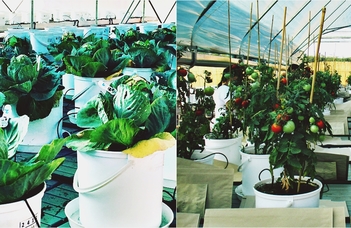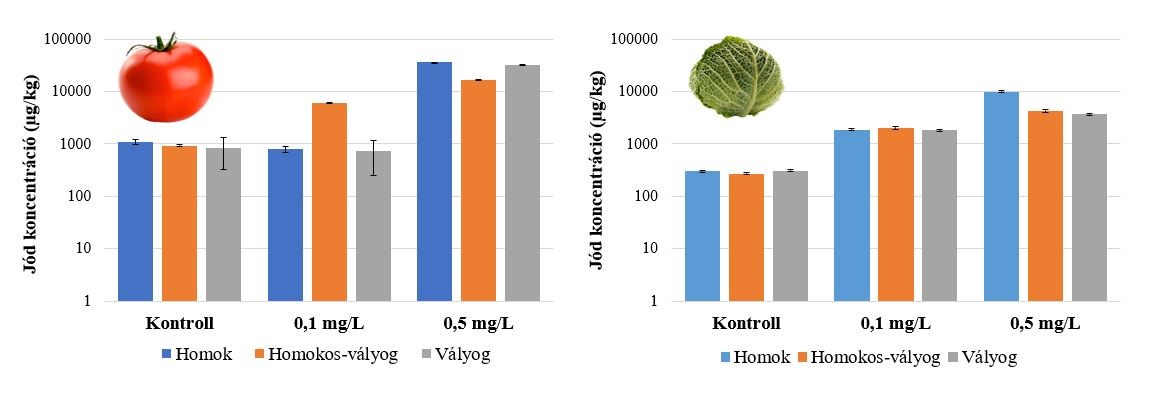
Effect of iodine containing irrigation water on the quality of tomato and cabbage plants
Vetési Viktória, III. year PhD-student
Doctoral School of Environmental Sciences - Environmental Chemistry
Supervisor: Dobosy Péter
Iodine (I) is an essential element for thyroxine and triiodothyronine hormones which are involved in the synthesis of sugars, nucleic acids, and proteins. The recommended daily iodine intake is 90 µg, 120 µg and 150 µg for the age groups of 0–59 months, 6–12 years, as well as adolescents and adults, respectively. During pregnancy and lactation, 250 µg daily intake is recommended. Iodine deficiency disorders (IDDs) affect 1.8-2 billion people in the world and IDDs leads to several diseases like goitre, hypothyroidism, psychomotor defects, hearing/speech impairment, and developmental delay. IDDs are also a great problem in Hungary, however, research data are limited. According to a report in 1999 the goitre ratio for the age groups of 7–11 year students was more than 30%, however, based on the recommendation of World Health Organization this value should not be exceed 5%. Preventing IDDs symptoms biofortification of vegetables with iodine has been proven to be an alternative and cost-effective way to provide iodine in the human diet.
In my research the effects of iodine containing irrigation water on the quality of tomato (Solanum lycopersicum L.) and cabbage (Brassica oleracea L. var. capitata L.) plants were studied. In the experimental work dry mass, iodine and essential element concentrations in different plants parts (root, aerial- and edible parts) were determined. Plant cultivation was performed in an open greenhouse, the experimental area received natural light for which climate data (light intensity, humidity, temperature) were continuously monitored during the growth period. Tomato and cabbage were cultivated in three soils (sand, sandy silt, silt) having different physico-chemical parameters, and plants were irrigated with water having 0.1 and 0.5 mg/L iodine concentrations. Plant parts were dried by using lyophilization and laboratory oven, then dry mass was measured. After sample homogenization iodine and essential element concentrations (Mg, P, Fe, Mn, Cu, Zn, B) were determined by using inductively coupled plasma mass spectrometer following microwave assisted acidic digestion.
Cultivating plants in sandy silt soil, the effect of iodine treatment on the production of tomato and cabbage edible parts showed significant increment (30-70%). Iodine addition resulted in slightly decrement of tomato (13-30%) cultivating in silt soil, while at iodine concentration of 0.1 mg/L the yield was increased (6%) on sand soil. The growth of cabbage leaves was stimulated (6-15%), while the mass of edible parts decreased by 22% applying 0.1 mg/L iodine concentration and cultivated in silt soil.

Addition of iodine to the irrigation water resulted in higher iodine concentration in all investigated plant tissues, especially when the dosage was 0.5 mg/L. Our results showed, that sand soil seemed to be the best cultivation medium, applying irrigation water in concentration of 0.5 mg I/L the iodine concentrations of tomato fruits and cabbage leaves were 3.6 and 10 mg/kg, respectively.

The presence of iodine partly influenced the uptake and translocation of macro- and microelements, only concentrations of phosphorus and iron changed. Phosphorus content of both plants and iron concentration in tomato plants reduced significantly, while iron content of cabbage leaves increased.
It can be concluded that iodine treatment had significant effect on the growth and the concentrations of phosphorous and iron in both plants. Applying 0.5 mg I/L in the irrigation water the iodine concentrations of edible parts was increased significantly and it can be calculated that consuming 12 and 50 dkg cabbage leaf and tomato fruit would cover the daily iodine intake of an average adult person (150 µg I/day).

